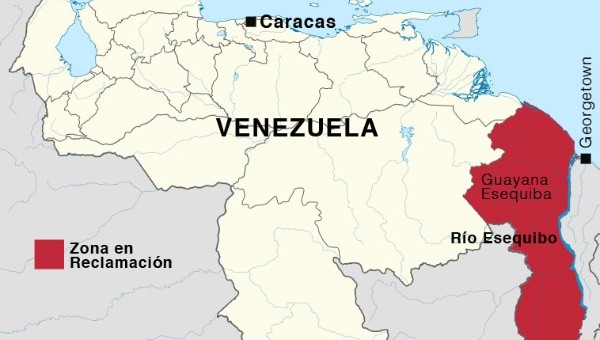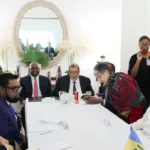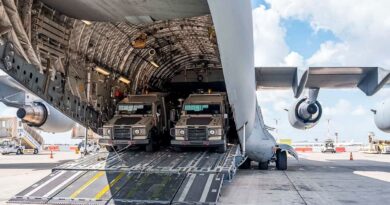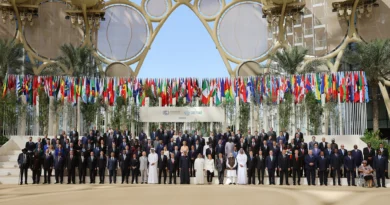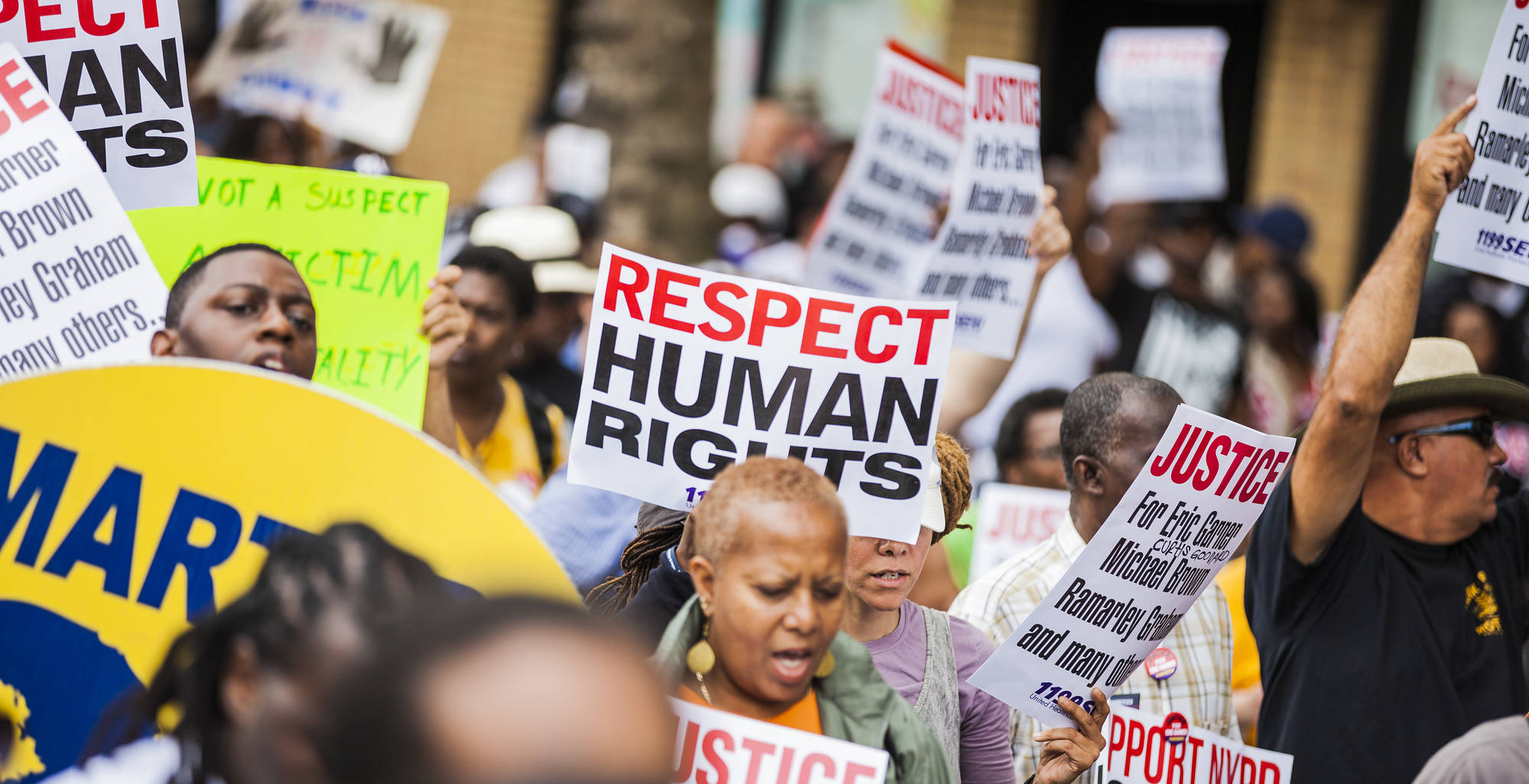Guyana, the spearhead of the US to expand militarily in Latin America
KAREN MENDEZ
The United States intends to use a historic territorial dispute between Venezuela and Guyana over the Essequibo to promote an armed conflict in Latin America, justify military expansion in the region and thus take control of the continent's immense wealth, as confessed by the head of the Southern Command, Laura Richardson, at the beginning of 2023 when she said that for the United States “Latin America is important” because of the Lithium triangle in Argentina, Bolivia and Chile and because of the oil discovered in Guyana (actually in Essequibo). She said that, for these reasons, they would “step up their game,” as is being seen.
But to fully understand what is happening, it is necessary to clarify point by point what is happening.
What is Essequibo?
Guayana Esequiba or also known as Essequibo is a territory of 159.500 square kilometers that has always belonged to Venezuela, as established in the maps and documents of this country when it was a Spanish colony with the Captaincy General of 1777 and as established in the first constitutions of Venezuela when its liberators won independence and regained control of all the territory of Spanish rule.
The United Kingdom, once it took over the Argentine Malvinas, wanted to take control of the Essequibo for two reasons: because of the immense gold deposits that were in those lands and because by taking over the mouths of the Orinoco River it could control maritime trade in South America.
Guyana and the Arbitration Award of 1899
Guyana alleges that the Essequibo is theirs because it was established in the Arbitration Award of 1899. And what is this? The Arbitration Award is a judicial ruling handed down by a French court in 1899. Since Venezuela never stopped denouncing British expansion in that territory, the English threatened to use force.
At that moment, the United States entered the scene, already emerging as a world power and already proclaiming its Monroe Doctrine of “America for Americans,” alerting the United Kingdom that it would not allow the use of force by a foreign power on this continent without its consent. , so he proposed that they go to international arbitration or else they would enter into a warlike confrontation with them. The British, already overwhelmed by so many armed conflicts, accepted, but with two conditions: that Venezuela would not have direct legal representation in that trial and that they would not hand over anything they had occupied. And this is how the Arbitration Award of 1899 was reached, a judicial ruling that ruled in favor of the British and stripped Venezuela of 15% of its territory.
However, at the end of the 40s, one of the lawyers who participated in that trial, Severo Mallet Prevost, confessed almost at the end of his life that this trial was a political compromise against Venezuela, that false maps paid for by the government were used. United Kingdom and that the judges were pressured by the US and the United Kingdom to rule in favor of the British.
The Geneva Agreement of 1966
This confession generated a wave of indignation in Venezuela, causing the Arbitration Award to be declared null, void and illegal, and in 1962 the case was brought before the United Nations. Shortly after, the United Kingdom, seeing itself exposed, agreed to sign with Venezuela the well-known Geneva Agreement of 1966, the only legal mechanism in force on this matter that establishes that this controversy must be resolved in a peaceful, negotiated and satisfactory manner for both parties. However, three months later it ceded independence to what was then British Guiana (now the Cooperative Republic of Guyana) and ignored the issue.
Since then, the controversy with Guyana over this territory was carried out, with its ups and downs, in a peaceful manner.
The US enters the scene again
However, in 2015 again the participation of the United States marked a turning point in this story, and that is when the American transnational ExxonMobil announced the discovery of important oil deposits in the Essequibo.
From that moment on, the last two governments of Guyana have taken a series of actions that have strained relations with Venezuela:
- They scrapped the 1966 Geneva Agreement
- They took out the Arbitration Award of 1899 from the trunk of memories to argue that Essequibo belongs to them.
- They strengthened military alliances with the United States. The Department of Defense not only trains its military, but through the Southern Command it carries out constant armed exercises near Essequibo targeting Venezuela.
- And they began to tender for oil blocks not only in the Essequibo, in that area under claim, but in a sea yet to be delimited and even in incontrovertibly Venezuelan waters, such as those of the Amacuro Delta, which are the Atlantic façade of Venezuela.
And why did Guyana take this stance?
Guyana's change of position coincides with the contract they signed in 2016 with ExxonMobil, a transnational known for installing and removing governments in the world and for paying millions of dollars annually in lobbying.
Raphael Trotman, former Minister of Natural Resources of Guyana and who signed the contract with ExxonMobil, tells in a recent book he authored entitled From Destiny to Prosperity that already in 2015, when the Guyanese delegation went to the United States to attend the UN General Assembly, the highest official of ExxonMobil asked to meet with them to talk about the presence of his company in Essequibo.
Trotman says that in that meeting they dedicated themselves to talking about the discovery of oil in Essequibo, the production plan and “the potential threats from Venezuela” due to its claim to that territory.
Exxon demanded two things from Guyana: guarantee that the Essequibo remained within the territorial limits of its country and that Guyana would continue to assert its right over that area; and a secure, long-term contract.
For its part, Guyana requested financial support and help to face Venezuela's claim.
On the table, ExxonMobil put 18 million dollars, which, to justify it in its accounting, it called a “signature bonus.”
Trotman says that, after those meetings, the Government of Guyana deployed a great diplomatic effort on a regional and international scale to “get rid of the dark shadow of the continuous and growing threats from Venezuela” and that all this was paid for with the money that was given to them. the Exxon.
With those resources, Trotman says, they managed to “build a world-class legal team” while “imploring United Nations Secretary-General Antonio Guterres to “use his powers under the 1966 Geneva Agreement to go further.” beyond the good offices process and refer the territorial controversy to the International Court of Justice” so that that court, not recognized by Venezuela, could terminate this claim.
Trotman says that, after much effort, “Guterres took an unprecedented step on January 30, 2018 by referring the matter to the world court.” By then, the former Guyanese minister notes, his country's legal and expert team “was already in his place, ready and in a solid position to present his case” in March 2019.
For Trotman, these 18 million dollars that ExxonMobil delivered to the previous Guyanese Government were used satisfactorily and as an example he cites “the ruling on jurisdiction that this court issued on April 6, 2023.”
The detail is that Venezuela, since the 40s, has had a doctrine of not recognizing the International Court of Justice to resolve territorial issues of the country. Since the judicial compromise of which Venezuela was a victim became known with the Arbitration Award of 1899, this nation established that it would never again let a third party decide on the country's territorial matters.
In addition to that, the International Court of Justice took on the case without having the consent of the Venezuelan State, as it must have in these cases of territorial disputes and, in addition, the Venezuelan Government warns that the ICJ is chaired by a former State Department official. of the United States, a country that for 20 years has sought in a thousand ways to overthrow the Bolivarian Government.
Media and psychological operation
At the same time, ExxonMobil and the Guyanese Government have deployed a large media and psychological operation within Guyana that ensures that this company is synonymous with prosperity while Venezuela is a “dangerous enemy” and “aggressor” that wants to annex two-thirds of the territory. Guyanese.
All this is false. Venezuela does not want a single millimeter of Guyanese territory. Venezuela fully respects the sovereignty of Guyana, as it has done throughout its history with all countries in the world. What Venezuela claims is Essequibo, a territory that has always belonged to it. But, in addition, Venezuela has always made it clear that it is committed to a diplomatic, negotiated and satisfactory path for both parties and on several occasions President Nicolás Maduro has asked his Guyanese counterpart, Irfaán Alí, to sit down and talk, as established in the Agreement. Geneva.
The campaign of lies and fear has not only increased xenophobia against Venezuelans living in Guyana, but has allowed its current president, Irfaan Alí, to justify to public opinion using money from the Contingency Fund to buy military equipment at USA.
An example of this is the Berbice ship, worth 11.5 million dollars, which they bought from the American company Metal Shark, a company that, by the way, is the one that supplies military ships to Ukraine.
In Metal Shark press releases, point out that this new US patrol “will change the rules of the game for regional security” and that its sale to Guyana was achieved thanks to the lobbying of the US Embassy in Guyana.
Exxon and its siren songs
But there is something that they do not usually explain to the Guyanese in its proper measure, and that is that The contract with Exxon is totally unfavorable for that town.
For example, Exxon only pays Guyana 2% royalties, the lowest rate in the industry, for all oil produced and sold in that country.
In addition, Guyana has had to share the revenue with Exxon until this company recovers 75% of the cost it incurred to develop the project.
In turn, half of the 25% of the remaining profit must be given to Exxon. That is, Guyana has only kept 12,5% of the benefits from oil extraction.
Some rightly called this negotiation “the contract of the century” and Exxon describes Guyana as “the jewel in the crown.”
The most scandalous thing is that nothing signed can be reversed because this is what this contract establishes and because the Guyanese president insists that “the sanctity” of this agreement must be respected.
But, in addition, recently Guyanese newspapers reported that after audits it was detected that Exxon used part of Guyana's profits to cover advertisements promoting its company on social networks, as well as shows, parties, school fees and drivers for expatriate workers. of Exxon.
Few win, many lose
From this conflict that they want to provoke between Venezuela and Guyana, the United States wins on all sides: it will be able to secure the cheap oil that it needs so much for its survival (regardless of the prices or production quantities established by OPEC), its transnational Exxon will be able to refloat, as it has done, after several years in free fall, it will be able to continue making efforts to remove Venezuela from the political game and break with Latin American and Caribbean unity, which has so much slowed down its plans in the region, and also reinforce its remove Venezuela from the commercial game as an oil supplier in order to once again make way for its transnationals, its arms companies will be able to increase their sales by sending military equipment to Guyana and the Pentagon will have a new space to expand its military presence in the region in order to take over the natural and mineral resources of Latin America.
Those who will lose will be the same as always: the people, to whom they sell supposed rights such as the “right to defend themselves”, the “right to belong and expand”, the “right to be free” or to “develop”, when in reality What they do is use them as cannon fodder to protect the interests of the United States in the world. Because at the end of this whole story, it is not that the United States only wants to take Essequibo from Venezuela, it is that it also wants to take it away from the Guyanese so that the large American transnationals can control all the wealth of that region.

